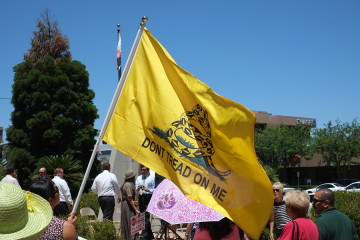Activists to File Lawsuit to Force Changes to Presidential Debates

©2015 Bloomberg News
NQBPK26JTSE8
(Bloomberg Politics) — A consortium seeking to expand the 2016 general-election presidential debates to independent and third-party candidates is suing the Federal Election Commission to try to force changes to a system they say is designed to keep power in the hands of Democrats and Republicans.
Level the Playing Field and the Green and Libertarian parties will file the lawsuit Monday in U.S. District Court for the District of Columbia, organizers said. The lawsuit seeks to direct the FEC to find that the Commission on Presidential Debates’ rules governing who can participate in general-election debates are too restrictive and violate the law, and to open a new rule-making process that allows broader, though not unrestricted, participation. The plaintiffs alternately want special permission from the court to sue the debate commission directly.
“American voters want a more open and competitive political system,” said Alexandra Shapiro, the lawyer representing the plaintiffs. “The American people are tired of the duopoly and they’re looking for a new voice and someone who’s independent of these two parties.”
The lawsuit comes at a time of rising controversy over debates in what is shaping up as a crowded election contest. Fox News is scheduled to host the first Republican primary debate in August, and the sheer volume of candidates prompted the network to set polling thresholds to limit participation to as few as 10, which nonetheless may yield an unwieldy juggling act.
Primary debates would not be affected by the lawsuit.
The CPD requires that debate participants be constitutionally qualified and on the ballot in enough states to have the possibility of getting to 270 electoral votes. But it is a third requirement—that candidates must poll at 15 percent or higher within weeks of the first debate—that those behind the lawsuit say shouldn’t stand. They say as a practical matter that’s impossible for candidates who haven’t run in a Democratic or Republican primary.
“It’s impossible to meet and designed to keep others out of the debate,” said Shapiro, who says under a strict reading of the rules, Ross Perot would not have qualified to debate as he did in 1992.
The FEC regulations also say that debate sponsors must be nonpartisan; plaintiffs argue the commission is really bipartisan rather than nonpartisan, run by forces in the Democratic and Republican parties with an interest in keeping the two parties in power. While the formats of the debates already are generating discussion, “we think it’s far more important to make sure that there’s an opportunity for a candidate who’s not in one of the two major parties to participate,” Shapiro said.
To contact the author on this story: Margaret Talev at mtalev@bloomberg.net To contact the editor on this story: Elizabeth Titus at etitus2@bloomberg.net







No Comment